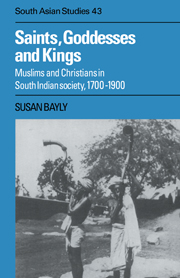Book contents
- Frontmatter
- Contents
- List of plates
- List of maps
- Preface
- Note on transliteration
- List of abbreviations
- Introduction
- Part I
- Part II
- 7 South Indian Christians in the pre-colonial period
- 8 The collapse of Syrian Christian ‘integration’
- 9 The Christian Paravas of southern Tamilnad
- 10 Christian saints and gurus in the poligar country
- 11 Christianity and colonial rule in the Tamil hinterland
- 12 Conclusion
- Select glossary
- Bibliography
- Index
- CAMBRIDGE SOUTH ASIAN STUDIES
- Plate section
11 - Christianity and colonial rule in the Tamil hinterland
from Part II
Published online by Cambridge University Press: 04 December 2009
- Frontmatter
- Contents
- List of plates
- List of maps
- Preface
- Note on transliteration
- List of abbreviations
- Introduction
- Part I
- Part II
- 7 South Indian Christians in the pre-colonial period
- 8 The collapse of Syrian Christian ‘integration’
- 9 The Christian Paravas of southern Tamilnad
- 10 Christian saints and gurus in the poligar country
- 11 Christianity and colonial rule in the Tamil hinterland
- 12 Conclusion
- Select glossary
- Bibliography
- Index
- CAMBRIDGE SOUTH ASIAN STUDIES
- Plate section
Summary
Status conflict in Vadakkankulam
Like the Parava localities of south India, during the nineteenth century many of the Tamil country's hinterland Christian centres were torn by fierce ceremonial ‘honours’ disputes – that is by conflicts over issues of caste rank and precedence. These battles had much in common with the honours disputes which had become such a widespread feature of Hindu temple festivals (utsavams) throughout the south. (See note 49, p. 42 above.) This came as a shock to most European observers: Christianity was supposed to teach spiritual egalitarianism, so why were these converts fighting over tokens of caste honour and ritual primacy as if they were Hindus? This question can best be answered by looking at some of the conflicts in detail. The Vadakkankulam locality is the obvious starting place: as was noted above, this early Christian cult centre became the site of a long-running series of inter-caste honours disputes, and there is a rich array of source material on the locality and its conflicts.
Vadakkankulam had an inherently unstable social ranking system, and the distinctions between élite Christian Pillaimar and ritually subordinate Shanars were probably beginning to generate tension in the village by the end of the eighteenth century. The deepening of these cleavage during the nineteenth and early twentieth centuries was a development which had parallels in many other parts of the south. But was this due to the socalled ‘rigidities’ of the Hindu caste system? Was the old caste order ‘breaking down’ as a result of social and economic modernisation, and was this why so many Christian converts were fighting to redraw their local ranking schemes?
The story of Vadakkankulam's nineteenth-century honours disputes begins with the locality's rapidly shifting demographic balance.
- Type
- Chapter
- Information
- Saints, Goddesses and KingsMuslims and Christians in South Indian Society, 1700–1900, pp. 420 - 452Publisher: Cambridge University PressPrint publication year: 1990



